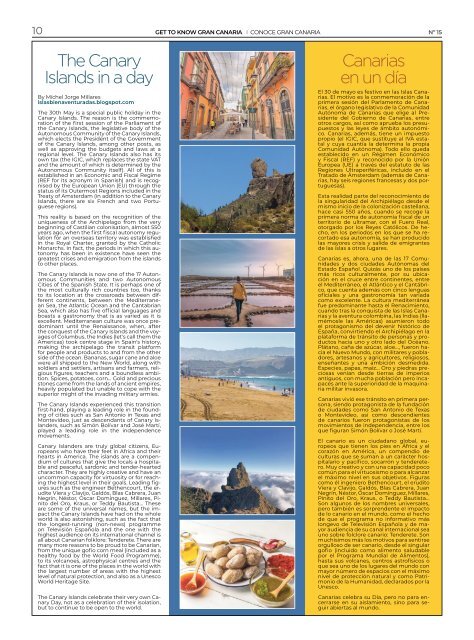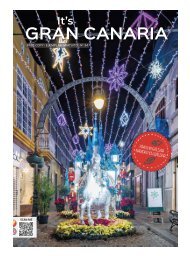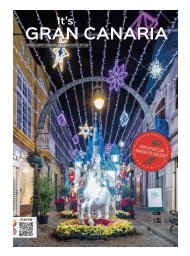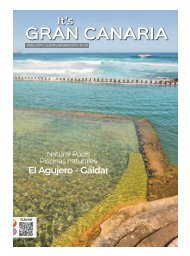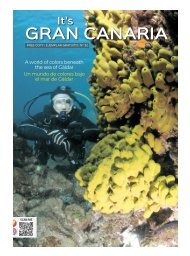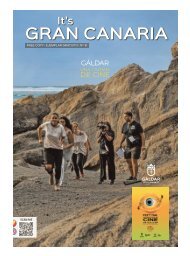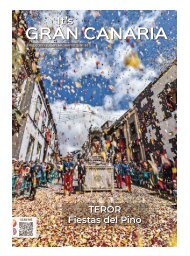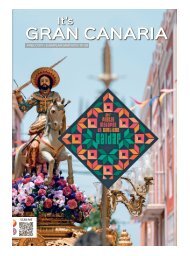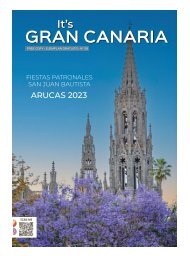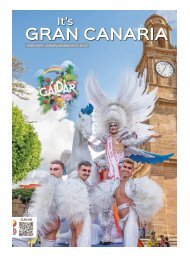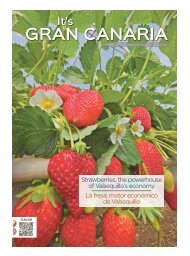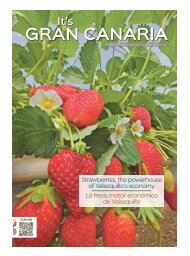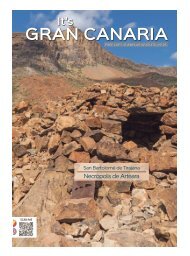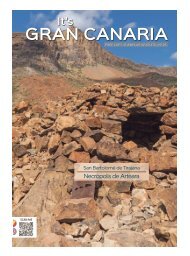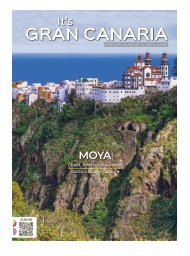No. 15 - Its Gran Canaria Magazine
Rutas, recomendaciones y noticias de Gran Canaria Routes, tips and news about Gran Canaria
Rutas, recomendaciones y noticias de Gran Canaria
Routes, tips and news about Gran Canaria
You also want an ePaper? Increase the reach of your titles
YUMPU automatically turns print PDFs into web optimized ePapers that Google loves.
10<br />
GET TO KNOW GRAN CANARIA I CONOCE GRAN CANARIA Nº <strong>15</strong><br />
The Canary<br />
Islands in a day<br />
By Míchel Jorge Millares<br />
islasbienaventuradas.blogspot.com<br />
The 30th May is a special public holiday in the<br />
Canary Islands. The reason is the commemoration<br />
of the first session of the Parliament of<br />
the Canary Islands, the legislative body of the<br />
Autonomous Community of the Canary Islands,<br />
which elects the President of the Government<br />
of the Canary Islands, among other posts, as<br />
well as approving the budgets and laws at a<br />
regional level. The Canary Islands also has its<br />
own tax (the IGIC, which replaces the state VAT<br />
and the amount of which is determined by the<br />
Autonomous Community itself). All of this is<br />
established in an Economic and Fiscal Regime<br />
(REF for its acronym in Spanish) and is recognised<br />
by the European Union (EU) through the<br />
status of its Outermost Regions included in the<br />
Treaty of Amsterdam (in addition to the Canary<br />
Islands, there are six French and two Portuguese<br />
regions).<br />
This reality is based on the recognition of the<br />
uniqueness of the Archipelago from the very<br />
beginning of Castilian colonisation, almost 550<br />
years ago, when the first fiscal autonomy regulation<br />
for an overseas territory was established<br />
in the Royal Charter, granted by the Catholic<br />
Monarchs. In fact, the periods in which this autonomy<br />
has been in existence have seen the<br />
greatest crises and emigration from the islands<br />
to other places.<br />
The Canary Islands is now one of the 17 Autonomous<br />
Communities and two Autonomous<br />
Cities of the Spanish State. It is perhaps one of<br />
the most culturally rich countries too, thanks<br />
to its location at the crossroads between different<br />
continents, between the Mediterranean<br />
Sea, the Atlantic Ocean and the Cantabrian<br />
Sea, which also has five official languages and<br />
boasts a gastronomy that is as varied as it is<br />
excellent. Mediterranean culture was once predominant<br />
until the Renaissance, when, after<br />
the conquest of the Canary Islands and the voyages<br />
of Columbus, the Indies (let's call them the<br />
Americas) took centre stage in Spain's history,<br />
making the archipelago the transit platform<br />
for people and products to and from the other<br />
side of the ocean. Bananas, sugar cane and aloe<br />
were all shipped to the New World, along with<br />
soldiers and settlers, artisans and farmers, religious<br />
figures, teachers and a boundless ambition.<br />
Spices, potatoes, corn… Gold and precious<br />
stones came from the lands of ancient empires,<br />
heavily populated but unable to cope with the<br />
superior might of the invading military armies.<br />
The Canary Islands experienced this transition<br />
first-hand, playing a leading role in the founding<br />
of cities such as San Antonio in Texas and<br />
Montevideo, just as descendants of Canary Islanders,<br />
such as Simón Bolívar and José Martí,<br />
played a leading role in the independence<br />
movements.<br />
Canary Islanders are truly global citizens, Europeans<br />
who have their feet in Africa and their<br />
hearts in America. The islands are a compendium<br />
of cultures that give the locals a hospitable<br />
and peaceful, sardonic and tender-hearted<br />
character. They are highly creative and have an<br />
uncommon capacity for virtuosity or for reaching<br />
the highest level in their goals. Leading figures<br />
such as the engineer Bethencourt, the erudite<br />
Viera y Clavijo, Galdós, Blas Cabrera, Juan<br />
Negrín, Néstor, Óscar Domínguez, Millares, Pinito<br />
del Oro, Kraus, or Teddy Bautista... These<br />
are some of the universal names, but the impact<br />
the Canary Islands have had on the whole<br />
world is also astonishing, such as the fact that<br />
the longest-running (non-news) programme<br />
on Televisión Española and the one with the<br />
highest audience on its international channel is<br />
all about <strong>Canaria</strong>n folklore: Tenderete. There are<br />
many more reasons to be proud to be <strong>Canaria</strong>n,<br />
from the unique gofio corn meal (included as a<br />
healthy food by the World Food Programme),<br />
to its volcanoes, astrophysical centres and the<br />
fact that it is one of the places in the world with<br />
the largest number of areas with the highest<br />
level of natural protection, and also as a Unesco<br />
World Heritage Site.<br />
The Canary Islands celebrate their very own Canary<br />
Day, not as a celebration of their isolation,<br />
but to continue to be open to the world.<br />
<strong>Canaria</strong>s<br />
en un día<br />
El 30 de mayo es festivo en las Islas <strong>Canaria</strong>s.<br />
El motivo es la conmemoración de la<br />
primera sesión del Parlamento de <strong>Canaria</strong>s,<br />
el órgano legislativo de la Comunidad<br />
Autónoma de <strong>Canaria</strong>s que elige al Presidente<br />
del Gobierno de <strong>Canaria</strong>s, entre<br />
otros cargos, así como aprueba los presupuestos<br />
y las leyes de ámbito autonómico.<br />
<strong>Canaria</strong>s, además, tiene un impuesto<br />
propio (el IGIC, que sustituye al IVA estatal<br />
y cuya cuantía la determina la propia<br />
Comunidad Autónoma). Todo ello queda<br />
establecido en un Régimen Económico<br />
y Fiscal (REF) y reconocido por la Unión<br />
Europea (UE) a través del estatuto de las<br />
Regiones Ultraperiféricas, incluido en el<br />
Tratado de Ámsterdam (además de <strong>Canaria</strong>s,<br />
hay seis regiones francesas y dos portuguesas).<br />
Esta realidad parte del reconocimiento de<br />
la singularidad del Archipiélago desde el<br />
mismo inicio de la colonización castellana,<br />
hace casi 550 años, cuando se recoge la<br />
primera norma de autonomía fiscal de un<br />
territorio de ultramar, con el Fuero Real,<br />
otorgado por los Reyes Católicos. De hecho,<br />
en los periodos en los que se ha recortado<br />
esa autonomía, se han producido<br />
las mayores crisis y salida de emigrantes<br />
de las islas a otros lugares.<br />
<strong>Canaria</strong>s es, ahora, una de las 17 Comunidades<br />
y dos ciudades Autónomas del<br />
Estado Español. Quizás uno de los países<br />
más ricos culturalmente, por su ubicación<br />
en el cruce entre continentes, entre<br />
el Mediterráneo, el Atlántico y el Cantábrico,<br />
que cuenta además con cinco lenguas<br />
oficiales y una gastronomía tan variada<br />
como excelente. La cultura mediterránea<br />
fue predominante hasta el Renacimiento,<br />
cuando tras la conquista de las Islas <strong>Canaria</strong>s<br />
y la aventura colombina, las Indias (llamémosle<br />
las Américas) asumieron todo<br />
el protagonismo del devenir histórico de<br />
España, convirtiendo el Archipiélago en la<br />
plataforma de tránsito de personas y productos<br />
hacia uno y otro lado del Océano.<br />
Plátano, caña de azúcar, aloe..., fueron hacia<br />
el Nuevo Mundo, con militares y pobladores,<br />
artesanos y agricultores, religiosos,<br />
enseñantes y una ambición desmedida.<br />
Especies, papas, maíz... Oro y piedras preciosas<br />
venían desde tierras de imperios<br />
antiguos, con mucha población pero incapaces<br />
ante la superioridad de la maquinaria<br />
militar invasora.<br />
<strong>Canaria</strong>s vivió ese tránsito en primera persona,<br />
siendo protagonista de la fundación<br />
de ciudades como San Antonio de Texas<br />
o Montevideo, así como descendientes<br />
de canarios fueron protagonistas de los<br />
movimientos de independencia, entre los<br />
que figuran Simón Bolívar o José Martí.<br />
El canario es un ciudadano global, europeos<br />
que tienen los pies en África y el<br />
corazón en América, un compendio de<br />
culturas que se suman a un carácter hospitalario<br />
y pacífico, socarrón y tenderetero.<br />
Muy creativo y con una capacidad poco<br />
común para el virtuosismo o para alcanzar<br />
el máximo nivel en sus objetivos. Figuras<br />
como él ingeniero Bethencourt, el erudito<br />
Viera y Clavijo, Galdós, Blas Cabrera, Juan<br />
Negrín, Néstor, Óscar Domínguez, Millares,<br />
Pinito del Oro, Kraus, o Teddy Bautista...<br />
Son algunos de los nombres universales,<br />
pero también es sorprendente el impacto<br />
de lo canario en el mundo, como el hecho<br />
de que el programa no informativo más<br />
longevo de Televisión Española y de mayor<br />
audiencia de su canal internacional sea<br />
uno sobre folclore canario: Tenderete. Son<br />
muchísimos más los motivos para sentirse<br />
orgulloso de ser canario, desde el singular<br />
gofio (incluido como alimento saludable<br />
por el Programa Mundial de Alimentos),<br />
hasta sus volcanes, centros astrofísicos o<br />
que sea uno de los lugares del mundo con<br />
mayor número de espacios con el máximo<br />
nivel de protección natural y como Patrimonio<br />
de la Humanidad, declarados por la<br />
Unesco.<br />
<strong>Canaria</strong>s celebra su Día, pero no para encerrarse<br />
en su aislamiento, sino para seguir<br />
abiertas al mundo.


